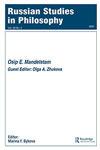对布尔加科夫的两次谴责
IF 0.1
4区 哲学
Q4 Arts and Humanities
引用次数: 2
摘要
本文使用谢尔盖·布尔加科夫大祭司的个人日记和回忆录来考察1922年底他被驱逐出布尔什维克占领的克里米亚的情况。当时,他是雅尔塔亚历山大·涅夫斯基大教堂的院长。驱逐Sergius神父是驱逐不符合新政府意识形态轮廓的人文主义知识分子的大规模行动的一部分。我们将研究的政治方面的谴责Fr. Sergius的学说索菲亚,神学的发展,他开始流亡。我们还将研究谢尔盖神父对君主制的态度和他对“白色沙皇”的信仰的各个方面,注意到布尔加科夫作为一个本文章由计算机程序翻译,如有差异,请以英文原文为准。
Two Condemnations of Sergei Bulgakov
ABSTRACT This article uses the personal diaries and memoirs of Archpriest Sergius (Sergei) Bulgakov to examine the circumstances of his expulsion from Bolshevik-occupied Crimea in late 1922. At the time, he was rector of the Alexander Nevsky Cathedral in Yalta. The expulsion of Fr. Sergius was part of a large-scale operation to expel the humanist intelligentsia, who did not fit within the ideological contours of the new government. We will examine the political aspects of the condemnations of Fr. Sergius’s doctrine of Sophia, the theological development of which he began in exile. We will also examine aspects of Fr. Sergius’s attitude to monarchy and his belief in the “white tsar,” noting that Bulgakov’s position as an émigré could hardly be characterized as monarchical. Sophiology may be the political equivalent of ecclesiastical democracy, of faith in the ecclesiastical people and the Christian community, which was alien to the conservative monarchism of Orthodox believers abroad, centered in Serbia’s Sremski Karlovci. We will examine the circumstances of the church’s condemnation of Fr. Sergius, which took place against the context of canonical uncertainty, and we will touch upon some aspects of the contemporary reception of Sophiology in Russia in a political context (V. Bibikhin, O. Kirichenko).
求助全文
通过发布文献求助,成功后即可免费获取论文全文。
去求助
来源期刊

RUSSIAN STUDIES IN PHILOSOPHY
PHILOSOPHY-
CiteScore
0.10
自引率
0.00%
发文量
14
期刊介绍:
Russian Studies in Philosophy publishes thematic issues featuring selected scholarly papers from conferences and joint research projects as well as from the leading Russian-language journals in philosophy. Thematic coverage ranges over significant theoretical topics as well as topics in the history of philosophy, both European and Russian, including issues focused on institutions, schools, and figures such as Bakhtin, Fedorov, Leontev, Losev, Rozanov, Solovev, and Zinovev.
 求助内容:
求助内容: 应助结果提醒方式:
应助结果提醒方式:


